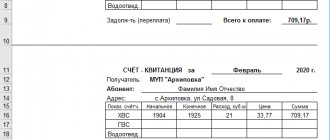Information on the receipt
Receipts are intended for financial payment, so it is important that the receipts are in the exact form approved by law.
There are a number of data that must be included in the receipt for payment of utility services, namely:
- Types of communal resources. The type of good consumed must be indicated, not the general name.
- Consumption standards.
- Requisites. The receipt must indicate the bank details of the company where the money is transferred.
Management companies rarely give recommendations to residents regarding the storage of receipts, so that in the event of a dispute they have an advantage in evidence over the owner. Payment for consumed resources is made monthly. The homeowner receives a receipt indicating how many resources were consumed and how much he needs to pay for the services provided. If the money is not deposited within the prescribed period, then the person becomes a debtor.
But if the reason for the lack of money is, for example, a technical failure, then such debt can be canceled in court. If the payment was made in full, but it did not reach the account and the person lost the receipt, then the citizen will not be able to prove the fact of payment and will have to pay a second time for the service received.
Storage period for paid housing and communal services receipts
Often, when moving to a new apartment, a banking institution or management company asks you to provide paid utility bills. In a financial and credit organization, evidence of payments made may be lost due to the fault of employees. In addition, employees sometimes transfer money to completely unrelated accounts. In such situations, only the provided payments are guaranteed to protect your rights in the courts or before the management company. They may also be needed in cases of selling an apartment.
Today, in the age of digital technology, you can do this freely in your personal bank account or terminals. In an electronic device, before making a payment, you should check whether the machine prints a receipt. Otherwise, you should not deposit cash, as the machine will not issue a receipt.
We recommend reading: There is a debt for alimony, how to travel abroad
How long to keep payment documents
Keeping receipts for utility bills is not the owner’s responsibility by law. The law does not clearly define when it is permissible to throw away receipts, so you can refer to the statute of limitations. We are talking about the period during which a person, if his rights are violated, can protect them in court.
In this case, the period is 3 years, but an ordinary citizen cannot always correctly determine the beginning of this three-year period, so it makes sense to store documents for at least 5 years. Since even after 3 years, the management company can make claims for payment of utilities and go to court, and if the court determines that the statute of limitations has not expired, then it will be possible to prove its case only with a document confirming the fact of payment.
Thus, despite the fact that the statute of limitations by law is 3 years, it is still recommended to keep payment documents for at least 5 years to avoid problems.
Retention period for utility bills
December 28, 2016
Storing payment documents becomes difficult due to the space they take up. But how long are utility bills kept? And what's the point of doing this?
A computer failure, regular changes in tariffs that cause confusion, dishonesty of employees of the counting center and elementary attempts at fraud lead to a legal battle between the consumer of housing and communal services and the management company. In this case, only documentary evidence confirming the fact that gas, water, electricity and other consumer products were paid for is used as evidence of correctness.
Some grandmothers stubbornly keep paid receipts for the last 20-25 years; this is not necessary, but you will have to take into account several nuances:
- Not a single regulatory act specifically specifies how many years it is necessary to keep receipts with a mark or check for payment of housing and communal services, so the law on the statute of limitations for claims comes into play. According to it, the statute of limitations for disputes of this kind expires 3 years from the moment the problem situation arises.
- This law is not an obstacle to the court accepting a claim, but if this point is voiced in court, the decision in 100% of cases will be made in favor of the service consumer.
- It happens that management companies try to resort to various kinds of tricks, trying to forcefully extend the statute of limitations. This happens extremely rarely, only in the event of real force majeure circumstances. For example, the entire management company was on a desert island for three years and did not have the opportunity to go to court to collect the debt for housing and communal services.
Money is deposited through terminals that accept payments for many services, through enterprise cash desks or Unified Settlement Centers that accept money from the public. In the electric power industry, there are companies engaged solely in collecting funds for services provided.
They are needed to prove the claims are unfounded. Due to the lack of properly organized work of departments in public utilities, bills are issued to bona fide payers. The only way to solve the problem is to provide receipts confirming the absence of debt. The court hearing is closed as soon as the consumer provides utility receipts.
Limitation period for debts
Regulatory documents do not indicate specific storage periods for receipts. But the Civil Code of the Russian Federation establishes that the general limitation period is 3 years; accordingly, if during this period a dispute arises regarding the payment or charging of utilities, then a receipt will be required as evidence.
You should pay attention to confirmation of payment for utility services; it can be recorded on the receipt itself, as well as by attaching receipts. When paying online, you should also print out all receipts and attach them to your receipts.
After the statute of limitations has expired, if possible, it is better to keep receipts and checks for a period of 5-6 years, as they will be proof of your good faith.
How long payment papers are kept depends on the status of the payer - it is an enterprise or a citizen.
For legal entities
Methodological recommendations for organizations have been developed, based on the requirements of the law of October 22, 2004 N 125-FZ “On Archiving in the Russian Federation”. They indicate that documents relating to settlements with suppliers are stored for 5 years.
This is due to the fact that the Federal Tax Service and other regulatory organizations can check documents for the previous three years, and more if necessary (for example, if the check started earlier and the deadlines were extended), and both parties can check - the payer, the management company, and verify their data in within the framework of counter checks. But this applies to companies.
For individuals
There is no law obliging citizens to keep checks and other documents confirming payments for a certain number of years. There are also no regulatory requirements for citizens regarding storage periods.
Conclusion
Utilities must be paid monthly using the receipts provided. Payment receipts are documents confirming the fact of payment of the invoiced amount. In the absence of a receipt, it will be difficult for the owner to prove the payment of funds. You need to keep checks for 5 years or more, since even the expiration of a three-year statute of limitations does not always guarantee a person protection from penalties from the management company.
With the topic : How, by taking two months off, you can significantly increase the size of your pension
can be found at the link
With the topic How you can lose your pension for several months due to a change of bank
can be found at the link
With the topic : Prohibition of laminating documents and the consequences of this
can be found at the link
How long to keep housing and communal services receipts
Checks for payment for housing and communal services are issued in accordance with the requirements of Order of the Ministry of Construction of the Russian Federation No. 43/pr, signed in January 2018. It is the property owner's responsibility to ensure that the invoice is properly formatted and includes a separate line item for each payment item. The document provides for the following information:
- payment purpose;
- volume of energy resources expended;
- established standards (if any);
- payer details;
- addresses of the apartment where payment is made;
- recipient details.
It is necessary to store only correctly completed documentation in order to avoid possible troubles if discrepancies arise when accounting for payments with the management company or resource supplier.
We recommend: How and where to register a water meter
The legislation does not directly establish the period during which it is necessary to keep receipts for repayment of utility bills. But, according to Art. 196 of the Civil Code of the Russian Federation, an appeal to the court regarding debt collection is allowed no later than three years from the moment of its occurrence.
Taking into account this condition, the storage period for documents confirming payments is also three years. After the specified period, the utility organization will no longer be able to go to court with claims against the consumer. But in order to eliminate possible problems, it would not hurt to extend the duration of ensuring the safety of papers to 4–5 years.
The need to provide receipts may arise for the following reasons:
- incorrect addressing of the payment made;
- improper accounting in the utility company;
- failures in the operation of computer equipment, as a result of which data may be lost or damaged.
The presence of a paper payment is a documentary confirmation of the transfer of funds, with the help of which the consumer is guaranteed to prove the fact of transferring money if there is any doubt about it.
We recommend: How much electricity does a microwave oven consume?
Storage period for payments for utilities and housing services
- Types of communal resources. In order to clearly identify how much the user is required to pay in the current month for a specific utility service, and not for everything in general, the name of each resource is written on the receipt. These values are entered in the first column of the payment order, and their characteristics are written in all other columns;
- Consumption standards . The bill also indicates the consumption standards for each utility resource approved by the Housing Code and Government Decree. Quantitative indicators are written in the adjacent column. In other words, numbers indicating how much a user consumed a particular service. By multiplying the consumption rate by its quantity, an individual will be able to independently check whether the correct amount has been charged to him for payment;
- Requisites. As with any other document, the receipt for repayment of the monthly fee for the use of utility services must contain general information. First of all, this is the last name, first name and patronymic of the individual who is the owner of the property, as well as the address of the apartment/house. In addition, the bank details of the management office to whose account the funds must be transferred must be entered correctly. These details include the bank identification code (BIC) and the legal entity itself (TIN), a transit account, as well as some others.
We recommend reading: Returns from the purchase of real estate
Many consumers automatically have questions about how long to keep receipts for utility bills and when it will be possible to finally get rid of a whole mountain of papers. In order to be able to prove the opposite in the event of any misunderstandings about the fact that an individual did not pay for gas, water or other services, he will need to provide the management service with the appropriate receipt.







